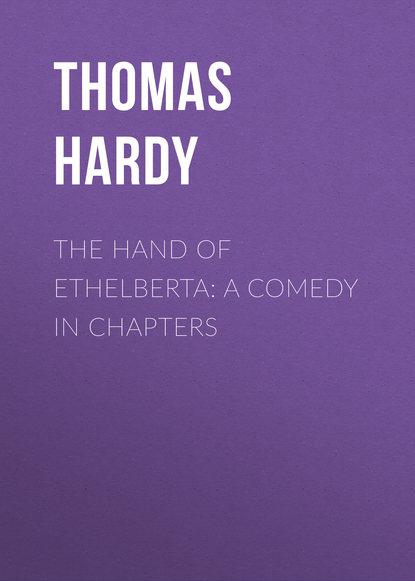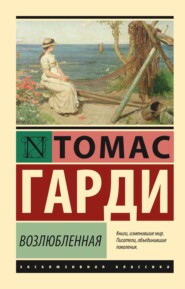По всем вопросам обращайтесь на: info@litportal.ru
(©) 2003-2025.
✖
The Hand of Ethelberta: A Comedy in Chapters
Автор
Год написания книги
2017
Настройки чтения
Размер шрифта
Высота строк
Поля
The speakers passed on, their backs becoming visible through the opening. They appeared to be woodmen.
‘What Lady Mountclere do they mean?’ said Ethelberta.
The woman blushed. ‘They meant Miss Gruchette.’
‘Oh – a nickname.’
‘Yes.’
‘Why?’
The woman whispered why in a story of about two minutes’ length. Ethelberta turned pale.
‘Is she going to return?’ she inquired, in a thin hard voice.
‘Yes; next week. You know her, m’m?’
‘No. I am a stranger.’
‘So much the better. I may tell you, then, that an old tale is flying about the neighbourhood – that Lord Mountclere was privately married to another woman, at Knollsea, this morning early. Can it be true?’
‘I believe it to be true.’
‘And that she is of no family?’
‘Of no family.’
‘Indeed. Then the Lord only knows what will become of the poor thing. There will be murder between ’em.’
‘Between whom?’
‘Her and the lady who lives here. She won’t budge an inch – not she!’
Ethelberta moved aside. A shade seemed to overspread the world, the sky, the trees, and the objects in the foreground. She kept her face away from the woman, and, whispering a reply to her Good-morning, passed through the hollies into the leaf-strewn path. As soon as she came to a large trunk she placed her hands against it and rested her face upon them. She drew herself lower down, lower, lower, till she crouched upon the leaves. ‘Ay – ’tis what father and Sol meant! O Heaven!’ she whispered.
She soon arose, and went on her way to the house. Her fair features were firmly set, and she scarcely heeded the path in the concentration which had followed her paroxysm. When she reached the park proper she became aware of an excitement that was in progress there.
Ethelberta’s absence had become unaccountable to Lord Mountclere, who could hardly permit her retirement from his sight for a minute. But at first he had made due allowance for her eccentricity as a woman of genius, and would not take notice of the half-hour’s desertion, unpardonable as it might have been in other classes of wives. Then he had inquired, searched, been alarmed: he had finally sent men-servants in all directions about the park to look for her. He feared she had fallen out of a window, down a well, or into the lake. The next stage of search was to have been drags and grapnels: but Ethelberta entered the house.
Lord Mountclere rushed forward to meet her, and such was her contrivance that he noticed no change. The searchers were called in, Ethelberta explaining that she had merely obeyed the wish of her brother in going out to meet him. Picotee, who had returned from her walk with Sol, was upstairs in one of the rooms which had been allotted to her. Ethelberta managed to run in there on her way upstairs to her own chamber.
‘Picotee, put your things on again,’ she said. ‘You are the only friend I have in this house, and I want one badly. Go to Sol, and deliver this message to him – that I want to see him at once. You must overtake him, if you walk all the way to Anglebury. But the train does not leave till four, so that there is plenty of time.’
‘What is the matter?’ said Picotee. ‘I cannot walk all the way.’
‘I don’t think you will have to do that – I hope not.’
‘He is going to stop at Corvsgate to have a bit of lunch: I might overtake him there, if I must!’
‘Yes. And tell him to come to the east passage door. It is that door next to the entrance to the stable-yard. There is a little yew-tree outside it. On second thoughts you, dear, must not come back. Wait at Corvsgate in the little inn parlour till Sol comes to you again. You will probably then have to go home to London alone; but do not mind it. The worst part for you will be in going from the station to the Crescent; but nobody will molest you in a four-wheel cab: you have done it before. However, he will tell you if this is necessary when he gets back. I can best fight my battles alone. You shall have a letter from me the day after to-morrow, stating where I am. I shall not be here.’
‘But what is it so dreadful?’
‘Nothing to frighten you.’ But she spoke with a breathlessness that completely nullified the assurance. ‘It is merely that I find I must come to an explanation with Lord Mountclere before I can live here permanently, and I cannot stipulate with him while I am here in his power. Till I write, good-bye. Your things are not unpacked, so let them remain here for the present – they can be sent for.’
Poor Picotee, more agitated than her sister, but never questioning her orders, went downstairs and out of the house. She ran across the shrubberies, into the park, and to the gate whereat Sol had emerged some half-hour earlier. She trotted along upon the turnpike road like a lost doe, crying as she went at the new trouble which had come upon Berta, whatever that trouble might be. Behind her she heard wheels and the stepping of a horse, but she was too concerned to turn her head. The pace of the vehicle slackened, however, when it was abreast of Picotee, and she looked up to see Christopher as the driver.
‘Miss Chickerel!’ he said, with surprise.
Picotee had quickly looked down again, and she murmured, ‘Yes.’
Christopher asked what he could not help asking in the circumstances, ‘Would you like to ride?’
‘I should be glad,’ said she, overcoming her flurry. ‘I am anxious to overtake my brother Sol.’
‘I have arranged to pick him up at Corvsgate,’ said Christopher.
He descended, and assisted her to mount beside him, and drove on again, almost in silence. He was inclined to believe that some supernatural legerdemain had to do with these periodic impacts of Picotee on his path. She sat mute and melancholy till they were within half-a-mile of Corvsgate.
‘Thank you,’ she said then, perceiving Sol upon the road, ‘there is my brother; I will get down now.’
‘He was going to ride on to Anglebury with me,’ said Julian.
Picotee did not reply, and Sol turned round. Seeing her he instantly exclaimed, ‘What’s the matter, Picotee?’
She explained to him that he was to go back immediately, and meet her sister at the door by the yew, as Ethelberta had charged her. Christopher, knowing them so well, was too much an interested member of the group to be left out of confidence, and she included him in her audience.
‘And what are you to do?’ said Sol to her.
‘I am to wait at Corvsgate till you come to me.’
‘I can’t understand it,’ Sol muttered, with a gloomy face. ‘There’s something wrong; and it was only to be expected; that’s what I say, Mr. Julian.’
‘If necessary I can take care of Miss Chickerel till you come,’ said Christopher.
‘Thank you,’ said Sol. ‘Then I will return to you as soon as I can, at the “Castle” Inn, just ahead. ’Tis very awkward for you to be so burdened by us, Mr. Julian; but we are in a trouble that I don’t yet see the bottom of.’
‘I know,’ said Christopher kindly. ‘We will wait for you.’
He then drove on with Picotee to the inn, which was not far off, and Sol returned again to Enckworth. Feeling somewhat like a thief in the night, he zigzagged through the park, behind belts and knots of trees, until he saw the yew, dark and clear, as if drawn in ink upon the fair face of the mansion. The way up to it was in a little cutting between shrubs, the door being a private entrance, sunk below the surface of the lawn, and invisible from other parts of the same front. As soon as he reached it, Ethelberta opened it at once, as if she had listened for his footsteps.
She took him along a passage in the basement, up a flight of steps, and into a huge, solitary, chill apartment. It was the ball-room. Spacious mirrors in gilt frames formed panels in the lower part of the walls, the remainder being toned in sage-green. In a recess between each mirror was a statue. The ceiling rose in a segmental curve, and bore sprawling upon its face gilt figures of wanton goddesses, cupids, satyrs with tambourines, drums, and trumpets, the whole ceiling seeming alive with them. But the room was very gloomy now, there being little light admitted from without, and the reflections from the mirrors gave a depressing coldness to the scene. It was a place intended to look joyous by night, and whatever it chose to look by day.
‘We are safe here,’ said she. ‘But we must listen for footsteps. I have only five minutes: Lord Mountclere is waiting for me. I mean to leave this place, come what may.’
‘Why?’ said Sol, in astonishment.
‘I cannot tell you – something has occurred. God has got me in his power at last, and is going to scourge me for my bad doings – that’s what it seems like. Sol, listen to me, and do exactly what I say. Go to Anglebury, hire a brougham, bring it on as far as Little Enckworth: you will have to meet me with it at one of the park gates later in the evening – probably the west, at half-past seven. Leave it at the village with the man, come on here on foot, and stay under the trees till just before six: it will then be quite dark, and you must stand under the projecting balustrade a little further on than the door you came in by. I will just step upon the balcony over it, and tell you more exactly than I can now the precise time that I shall be able to slip out, and where the carriage is to be waiting. But it may not be safe to speak on account of his closeness to me – I will hand down a note. I find it is impossible to leave the house by daylight – I am certain to be pursued – he already suspects something. Now I must be going, or he will be here, for he watches my movements because of some accidental words that escaped me.’

















